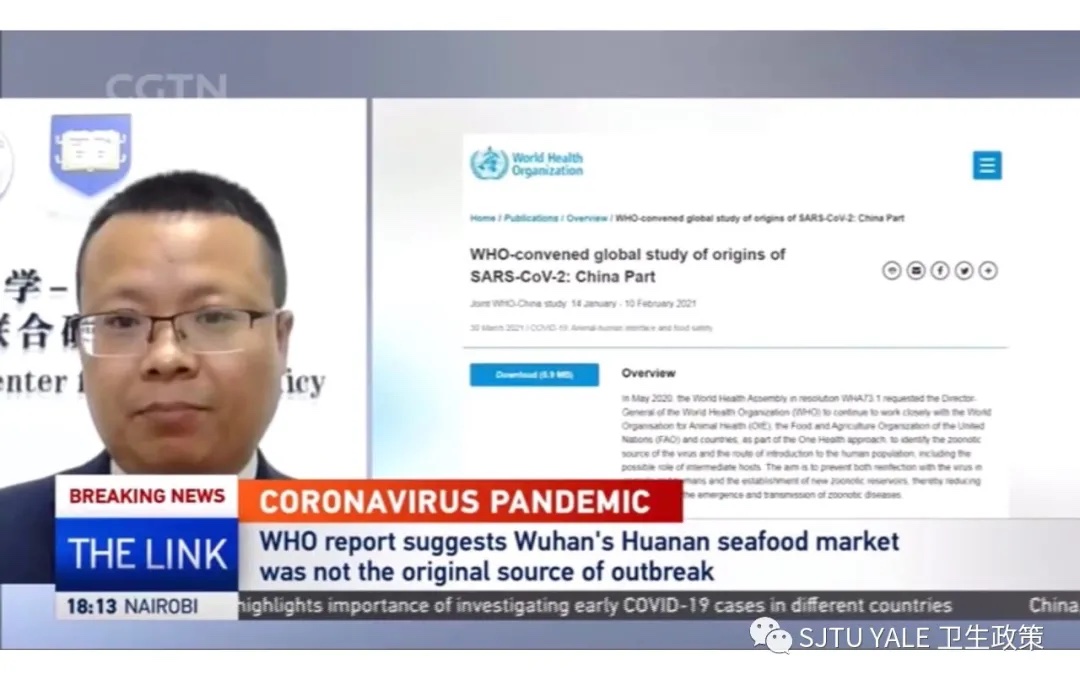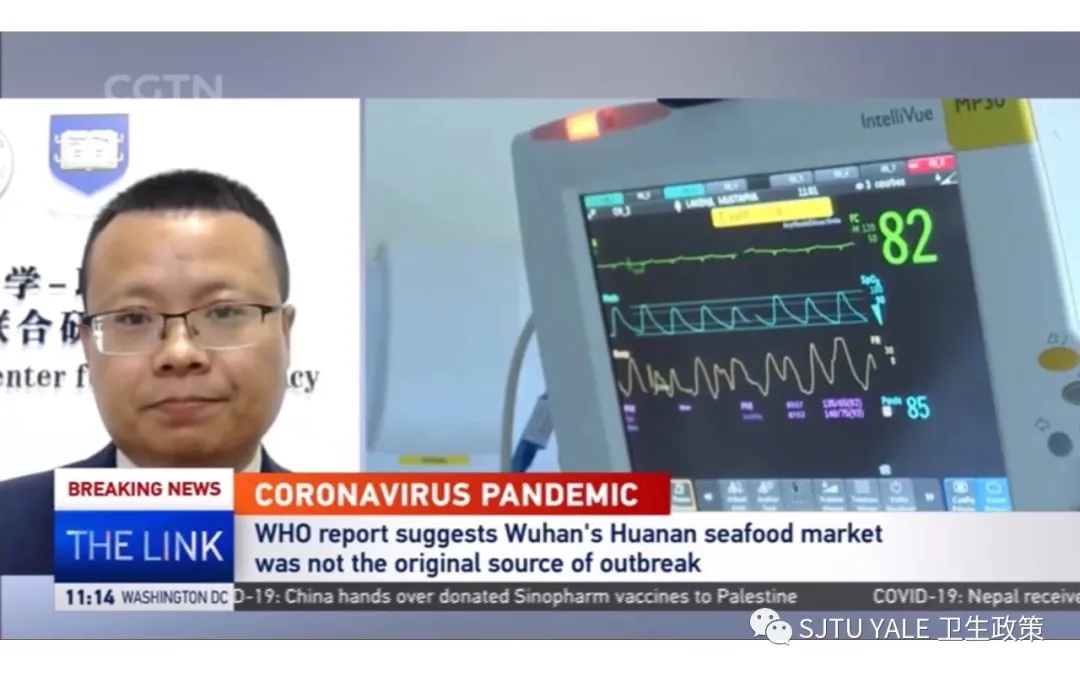上海交大赵大海教授接受央视专访:世卫组织对中国的新冠溯源报告科学合理
上海交通大学国际与公共事务学院教授、博士生导师,上海交通大学-耶鲁大学卫生政策联合研究中心执行主任赵大海,自新冠肺炎疫情暴发以来,对于新冠疫情暴发、防控以及卫生政策第51次接受中央电视台专访,也是第83次接受央视、上视专访。2021年3月30日,赵大海在中央电视台英语频道的《链接天下》节目,就世界卫生组织在当日发布的在中国的新冠病毒溯源报告进行了解释和评论。现将有关访谈内容翻译并摘录如下。

主持人:世界卫生组织的报告证实了武汉华南海鲜市场普遍存在感染。但它没有确定感染源。那么研究人员们将何去何从?
赵大海:我相信世界卫生组织目前关于新冠肺炎源头追溯的报告是科学的。实际上,病毒溯源是一项复杂的科学工作,需要持续和长期的努力,需要全球的合作。做好新冠肺炎病毒的溯源工作,不能只关注某个地方或某个时间,应以全球视角和全球协作。因此,至少有两个方向需要进一步研究。第一,针对华南海鲜市场,进一步开展流行病学调查工作。比如,相关的野生动物、冷链食品,应该开展进一步流行病学调查和检测工作。第二,其他国家类似的海鲜市场也应同步检测。我认为越来越多的国家的类似海鲜市场和蝙蝠等相关动物,应该作为下一步集中调查和检测的重点方向。

主持人:世界卫生组织的报告指出一种可能的病毒传播途径涉及中间动物宿主。您觉得怎么样?
赵大海:我同意世界卫生组织关于新冠病毒传播途径的报告。事实上,这一论点也得到了以往大量新冠病毒追溯研究的支持。例如,先前的研究表明,在蝙蝠和穿山甲中发现了与新冠病毒基因序列高度相似的冠状病毒,尽管这还不足以使其成为新冠病毒的直接宿主。更为重要的是,世界卫生组织的研究报告充分证实了新冠病毒不可能来自实验室。新冠病毒只是一场自然灾害,而不是人为实验室制造的大流行。因此,各国应共同努力来抗击新冠大流行。新冠病毒溯源的“政治化”不利于全球共同抗击新冠大流行,只会让更多的人失去生命。
供稿者:国务学院
日期:2021年3月31日
Dahai ZHAO’s Exclusive Interview with CGTN: WHO detailed the reasonable origin for novel coronavirus
Dahai Zhao, a doctoral supervisor at the School of International and Public Affairs of Shanghai Jiao Tong University and Executive Director of Shanghai Jiao Tong University-Yale University Joint Research Center for Health Policy, has been interviewed by CGYN for the 51st time (the 83st time by CGTN / ShanghaiTV) since the COVID-19 pandemic. On March 31, 2021, Zhao commented on the “WHO-China joint report on virus origins" on “The Link” of CGTN.
Anchor: The WHO report confirms the widespread contamination in Wuhan Huanan seafood market. but it did not determine the source of the contamination. Where do researchers go from here?
ZHAO: I believe the current WHO report on the tracing of COVID-19 is scientific. Actually, the traceability is a scientific exercise that is complex, requires sustained and long-term efforts, and requires global cooperation. Do a good job of tracing of the source of COVID-19, can not focus on a place or a certain time, should be a global perspective and global collaboration. Therefore, at least two directions should be further conducted. First, in terms of the Huanan seafood market, the epidemiology work should be further conducted. For example, the related wildlife, cold-chain foods, should be further detected. Second, the similar seafood market in other countries should also be detected at the same time. In addition, I think the seafood market and related animals such as the bat in more and more countries should be further detected.
Anchor:The WHO report says a likely virus transmission pathway involves an intermediary animal host. What’s your take?
ZHAO: I agree with the WHO’s report on the virus transmission pathway. Actually, this argument has also been supported by a large number of previous studies on the tracing of COVID-19. For example, previous studies have demonstrated that highly similar coronavirus to the gene sequence of the COVID-19 has been found in bats and pangolins, although it is not enough to make it a direct ancestor of the COVID-19. Furthermore, this argument has fully confirmed that it is impossible for the COVID-19 to be from the lab. It is only a natural disaster rather than man-made pandemic. Therefore, all countries should work together to fight against the COVID-19 pandemic. The "politicization" of the issue of traceability which will not only not contribute to global cooperation in the fight against the epidemic, but will also result in more loss of life.
Contributor: SIPA, SJTU
Date: March 31, 2021

